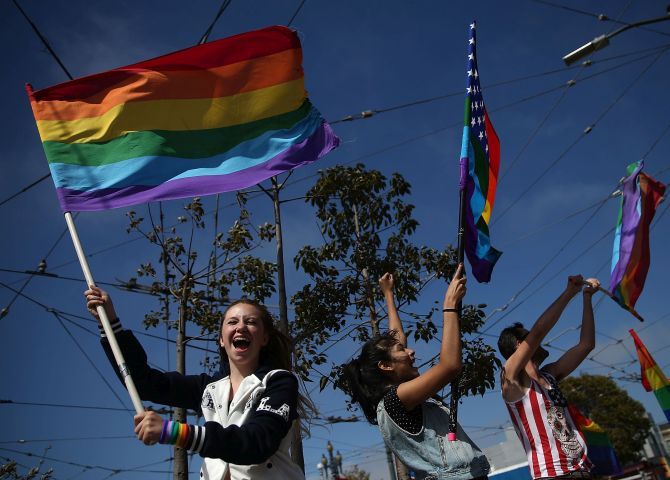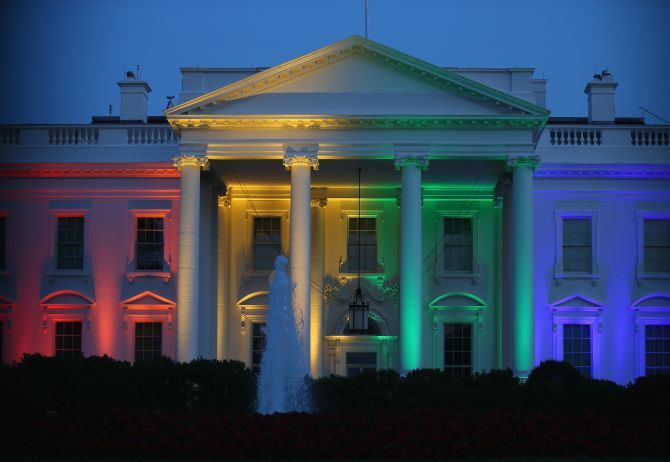‘This ruling has finally given us a base to stand on’.
Indian Americans and the larger Asian American community praised the United State Supreme Court ruling that provided same-sex couples the right to marry.
Speaking to Rediff.com’s Ritu Jha they said that the ruling will now help them ease the process of coming out to their families and also provide them with ‘true equality’.

On Friday, love truly conquered all.
The United States Supreme Court ruled on Friday that the Constitution provides same-sex couples the right to marry, handing a historic triumph to the American gay rights movement.
The court ruled 5-4 that the Constitution’s guarantees of due process and equal protection under the law mean that states cannot ban same-sex marriages. With the landmark ruling, gay marriage becomes legal in all 50 states.
The decision was hailed by all, including Indian-American elected officials, civil rights organisations. Celebrating the news, Council member Ash Kalra of California’s San Jose city, in a press note said, “As Americans, we must always strive to live up to the promise of our ideals to form a more perfect union that demands for equality for all. The decision has helped move us towards that ideal by ensuring that the commitment between two people is honoured regardless of who they choose to love.”
Nauman Butt of Pakistani origin heralded the decision with much enthusiasm. “I was planning to move to California to get married, as it wasn’t legal in Atlanta. I love kids and want to have a family,” said the 32-year-old, who is dating an Indian.
He says it’s harder for the Indian Americans and larger Asian American community to come out to their family. “It’s still a taboo and you can’t talk about it. But, this ruling has given us a base to stand on.”
Aparna Bhattacharyya, director of Raksha, a non-profit organisation, reacting to the Supreme Court ruling said, “This is huge news for us. I am so happy and excited. Raksha is the only south-asian organisation in Atlanta, so we try to help in whatever way we can by proving support for individual needs.”
“We weren’t sure it was going to happen. Many of my friends can now get married in Atlanta,” Bhattacharyya said, adding, “It’s a happy moment as couples in a same-sex relationship now have access to divorce, and adoption of children.”
She said the ruling will encourage more equality.

Monica Davis, the chairperson of Trikone – a non-profit support, social, and political organisation for South Asian bisexual, lesbian, gay, and transgender people – also welcomed the Supreme Court ruling. According to her, the ruling shows that America embraces freedom. She added that the decision would also bring more immigrants to the US.
The Supreme Court ruling is an opportunity for a culture shift, believes Davis. She says “In 1967, the United States Supreme Court had invalidated a wedding between Mildred Loving, a black woman, and Richard Loving, a white man. However, if that happens today, people will say ‘who cares’. Similarly, in 20 years from now because of this huge landmark decision, you will hear the same thing, ‘who cares’.”
She added that her friend from Texas was planning to get married in California. However, now her friend was tying the knot in September and in Texas.
The one huge benefit of this law that is relevant to South Asian community is that it provides job flexibility but the Lesbian, Gay, Bisexual, Transgender, Queer community still has many battles to fight before true “equality” can be achieved, she added.
“There are many issues around tansgenders; if a transgender woman is sent to a prison they are kept male prisons where there is high possibility of abuse. So there are many issues that we still have to work on,” she further stated.
“It is dangerous to think our work is over? the murder of trans people of colour and their invisibility in the larger march towards gay equality signals that we still have much to do.”










 © 2025
© 2025